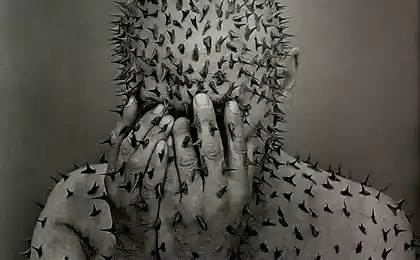503
Wyocena goodness — a dangerous habit!
We are taught from childhood to be good. But the goodness was understood by all in different ways in each family. Because it is always subjective.
But there are common ideas of goodness:
— Say thank you — we are taught to be polite;
— Don't be greedy, share it with your van toy/candy/anything of value — is estimated to shame us parents for the self-centeredness that prevent integration into society;
— Don't yell/don't swear/don't be angry/don't conflict — we are taught to be comfortable again, in the name of integration into society;
— Don't whine, bitch/cry, teach us not to show vulnerability.

In fact, in all these educational moments are common for my taste, grain:
— Courtesy allows you to do something nice or at least tolerable coexistence with other people, without the burden of clarifying the relations (to engage in an enabled relationship with the cashiers of a supermarket, for example, tiring);
— Sharing with others allows you to learn how to relate with others, to notice them, to broadcast friendship, to invite into relationship, to take care of.
— Ability to solve conflicts without use of force/shouting/insults/physical abuse allows us not to fall and not tear down others.
— Not to show their vulnerability to anyone, allows you to protect yourself from obestsenivaya and use.
But all these common grains fall, if all this learned goodness becomes Dagestanian, for failure to comply with which payback and shame.
The shame is always there where there is a rating of "good/bad". And very often, if we don't do as "good" boys/girls (that is, as we evaluated the significant adults), then POPs up a burning, poisonous stigma, sucking power, the paralyzing "I'm bad".
The stigma is so strong that even when it comes to values, the paralysis of shame may be stronger than the impulse to be myself, to live up to their values.
How many mothers and fathers loving their children, wanting to protect them, came to a screeching halt if their child was hurt at school the teacher or the Director? Or doctors. Or any power figures on which we unconsciously hang a parental role.
Because it figures in positions of authority.
And often, adults intelligent people suddenly become like children again, running into that familiar shock that pushes on the avoidance of conflict with such figures, even if it comes far indecent.
How many smart people were caught on fishing rod of the manipulators, the most common trick is to put everything so that they are good, helpful, polite, even if you frankly use, and I want to send them, and suddenly the shame fetter: "well, because he(a) courteous(a), and everything is so nicely decorated, good deeds, that if I Express what I feel (will be sent, shorter), then I'm guilty/burdened that sent(a) good man". If you can send only if clearly violated the border. And if they are violated on the sly, taking "a pen- — - they're here!", then send some sort of inadequate. And to become a manipulator well, do not want, because it is contrary to personal values.
How many people feel the need for support, but do not Express it, don't show, don't tell me their feelings. Even with those whom you trust. Because we protect them. Also, as taught by the parents to protect them from their vulnerability, because to survive parental impotence is much more difficult than to teach the child to hide the frustration, anger, sadness and the mountain.
And since few of us have maintained how you can survive difficult feelings as they are safe to Express that a parent cannot, of course, to teach the child what you do not know how myself. Gag, ban, intimidate and pristajati. In General, to do all the things that the parent is doing to himself.
And it turns out that the learned goodness is often destructive, crippling, paralysing shame.

What to do?
To find the middle. Look for your own evaluation and the adequacy. Because in different situations it is impossible to apply the same template.
Adequately whether polite fraud to send to the forest, even though outwardly all hush-hush? For my taste adequately.
And, of course, they don't like it. For them you become the bad CAD.
Yes, to be bad uncomfortable boor with polite people who form doing everything right, but in fact, I want you to fuck it badly. For them. But of course, you can afford to rape in the name of conformity to the concept of "gentle good man."
Is it appropriate to deny "good people" who seem not doing anything wrong, but the feeling that you have? Like anything the bad man does, but this molestation, couched in plausible excuses, profound resentment, if not to give them what they want, a silent sacrificial silence, filled with tragedy and a demonstration of destruction... or demonstrative pride, expressing resentment... or a polite "Yes, well, okay, all right. I'm sorry-I'm sorry, this is all my fault(a)" inviting feel cruel, insensitive creature.
Adequately whether to be a cruel unfeeling bitch towards those who are playing on the bright senses to try to grab what you want? For my taste Yes.
I read here on the Internet description very funny occasions.
For example, a person places an ad to sell something and knocks the girl with example text:
Oh, I love the bag that you sell. And I'm the mother of two children, sitting in the decree, no money, no time. Maybe you will help a lonely mother, bring me your bag for free, and I'll be immensely grateful!
— No, sorry, the bag sold for a specific price.
— God will punish you for what you are not helping those who are so hard!
Admiration, helpfulness, damage good — in the same piggy Bank. This manipulation works on the principle: well, I wish only the best, from the heart, with the light intentions, and I send. Doing so only insensitive cruel people, devalues light impulses. And the fact that this "light rush" — "disservice", it's a place driven as if by accident. And then in this scenario, go gossip, accusations and insults in the style of "I have so much to do(a), and so I tried, and that, and me..." In fact, scheme looks like this: person does something to another that he felt obligated/good/valuable/necessary, BUT instead on what you need the author causing good or flattery.
Adequately tough to put borders to pristegivaniem that minding my own business?
— Oh, you are so cool! Why are you still not married/no children/not have succeeded in a career/have not done anything.
In this seemingly familiar issue, already contains an evaluation. The type of "classy" — those who are married/with kids/successful in career/did anything.
It's a trap of shame in it? What if you trust someone's assessment about their own goodness, the machine inevitably have confidence in the assessment "you're bad" (and that is pristegivaniem).
And so, from this issue, if you trust the source, you can first to rise, and in this elation to feel something bitter, toxic. Shame, in short. And start to make excuses about why before this "class" could not reach. Or to indulge in long discussions about how space ships travel through life's vicissitudes.
In General, I as the person not by hearsay familiar with toxic, ingrained the shame, and has devoted this topic is not one year of research — both personal and professional, supportchew transmitted to us from the outside evaluation, and to form their own, focusing on each specific situation and context.published
Author: Ksenia Aleeva
P. S. And remember, only by changing their consumption — together we change the world! ©
Source: alyaeva.livejournal.com/108452.html
But there are common ideas of goodness:
— Say thank you — we are taught to be polite;
— Don't be greedy, share it with your van toy/candy/anything of value — is estimated to shame us parents for the self-centeredness that prevent integration into society;
— Don't yell/don't swear/don't be angry/don't conflict — we are taught to be comfortable again, in the name of integration into society;
— Don't whine, bitch/cry, teach us not to show vulnerability.

In fact, in all these educational moments are common for my taste, grain:
— Courtesy allows you to do something nice or at least tolerable coexistence with other people, without the burden of clarifying the relations (to engage in an enabled relationship with the cashiers of a supermarket, for example, tiring);
— Sharing with others allows you to learn how to relate with others, to notice them, to broadcast friendship, to invite into relationship, to take care of.
— Ability to solve conflicts without use of force/shouting/insults/physical abuse allows us not to fall and not tear down others.
— Not to show their vulnerability to anyone, allows you to protect yourself from obestsenivaya and use.
But all these common grains fall, if all this learned goodness becomes Dagestanian, for failure to comply with which payback and shame.
The shame is always there where there is a rating of "good/bad". And very often, if we don't do as "good" boys/girls (that is, as we evaluated the significant adults), then POPs up a burning, poisonous stigma, sucking power, the paralyzing "I'm bad".
The stigma is so strong that even when it comes to values, the paralysis of shame may be stronger than the impulse to be myself, to live up to their values.
How many mothers and fathers loving their children, wanting to protect them, came to a screeching halt if their child was hurt at school the teacher or the Director? Or doctors. Or any power figures on which we unconsciously hang a parental role.
Because it figures in positions of authority.
And often, adults intelligent people suddenly become like children again, running into that familiar shock that pushes on the avoidance of conflict with such figures, even if it comes far indecent.
How many smart people were caught on fishing rod of the manipulators, the most common trick is to put everything so that they are good, helpful, polite, even if you frankly use, and I want to send them, and suddenly the shame fetter: "well, because he(a) courteous(a), and everything is so nicely decorated, good deeds, that if I Express what I feel (will be sent, shorter), then I'm guilty/burdened that sent(a) good man". If you can send only if clearly violated the border. And if they are violated on the sly, taking "a pen- — - they're here!", then send some sort of inadequate. And to become a manipulator well, do not want, because it is contrary to personal values.
How many people feel the need for support, but do not Express it, don't show, don't tell me their feelings. Even with those whom you trust. Because we protect them. Also, as taught by the parents to protect them from their vulnerability, because to survive parental impotence is much more difficult than to teach the child to hide the frustration, anger, sadness and the mountain.
And since few of us have maintained how you can survive difficult feelings as they are safe to Express that a parent cannot, of course, to teach the child what you do not know how myself. Gag, ban, intimidate and pristajati. In General, to do all the things that the parent is doing to himself.
And it turns out that the learned goodness is often destructive, crippling, paralysing shame.

What to do?
To find the middle. Look for your own evaluation and the adequacy. Because in different situations it is impossible to apply the same template.
Adequately whether polite fraud to send to the forest, even though outwardly all hush-hush? For my taste adequately.
And, of course, they don't like it. For them you become the bad CAD.
Yes, to be bad uncomfortable boor with polite people who form doing everything right, but in fact, I want you to fuck it badly. For them. But of course, you can afford to rape in the name of conformity to the concept of "gentle good man."
Is it appropriate to deny "good people" who seem not doing anything wrong, but the feeling that you have? Like anything the bad man does, but this molestation, couched in plausible excuses, profound resentment, if not to give them what they want, a silent sacrificial silence, filled with tragedy and a demonstration of destruction... or demonstrative pride, expressing resentment... or a polite "Yes, well, okay, all right. I'm sorry-I'm sorry, this is all my fault(a)" inviting feel cruel, insensitive creature.
Adequately whether to be a cruel unfeeling bitch towards those who are playing on the bright senses to try to grab what you want? For my taste Yes.
I read here on the Internet description very funny occasions.
For example, a person places an ad to sell something and knocks the girl with example text:
Oh, I love the bag that you sell. And I'm the mother of two children, sitting in the decree, no money, no time. Maybe you will help a lonely mother, bring me your bag for free, and I'll be immensely grateful!
— No, sorry, the bag sold for a specific price.
— God will punish you for what you are not helping those who are so hard!
Admiration, helpfulness, damage good — in the same piggy Bank. This manipulation works on the principle: well, I wish only the best, from the heart, with the light intentions, and I send. Doing so only insensitive cruel people, devalues light impulses. And the fact that this "light rush" — "disservice", it's a place driven as if by accident. And then in this scenario, go gossip, accusations and insults in the style of "I have so much to do(a), and so I tried, and that, and me..." In fact, scheme looks like this: person does something to another that he felt obligated/good/valuable/necessary, BUT instead on what you need the author causing good or flattery.
Adequately tough to put borders to pristegivaniem that minding my own business?
— Oh, you are so cool! Why are you still not married/no children/not have succeeded in a career/have not done anything.
In this seemingly familiar issue, already contains an evaluation. The type of "classy" — those who are married/with kids/successful in career/did anything.
It's a trap of shame in it? What if you trust someone's assessment about their own goodness, the machine inevitably have confidence in the assessment "you're bad" (and that is pristegivaniem).
And so, from this issue, if you trust the source, you can first to rise, and in this elation to feel something bitter, toxic. Shame, in short. And start to make excuses about why before this "class" could not reach. Or to indulge in long discussions about how space ships travel through life's vicissitudes.
In General, I as the person not by hearsay familiar with toxic, ingrained the shame, and has devoted this topic is not one year of research — both personal and professional, supportchew transmitted to us from the outside evaluation, and to form their own, focusing on each specific situation and context.published
Author: Ksenia Aleeva
P. S. And remember, only by changing their consumption — together we change the world! ©
Source: alyaeva.livejournal.com/108452.html























